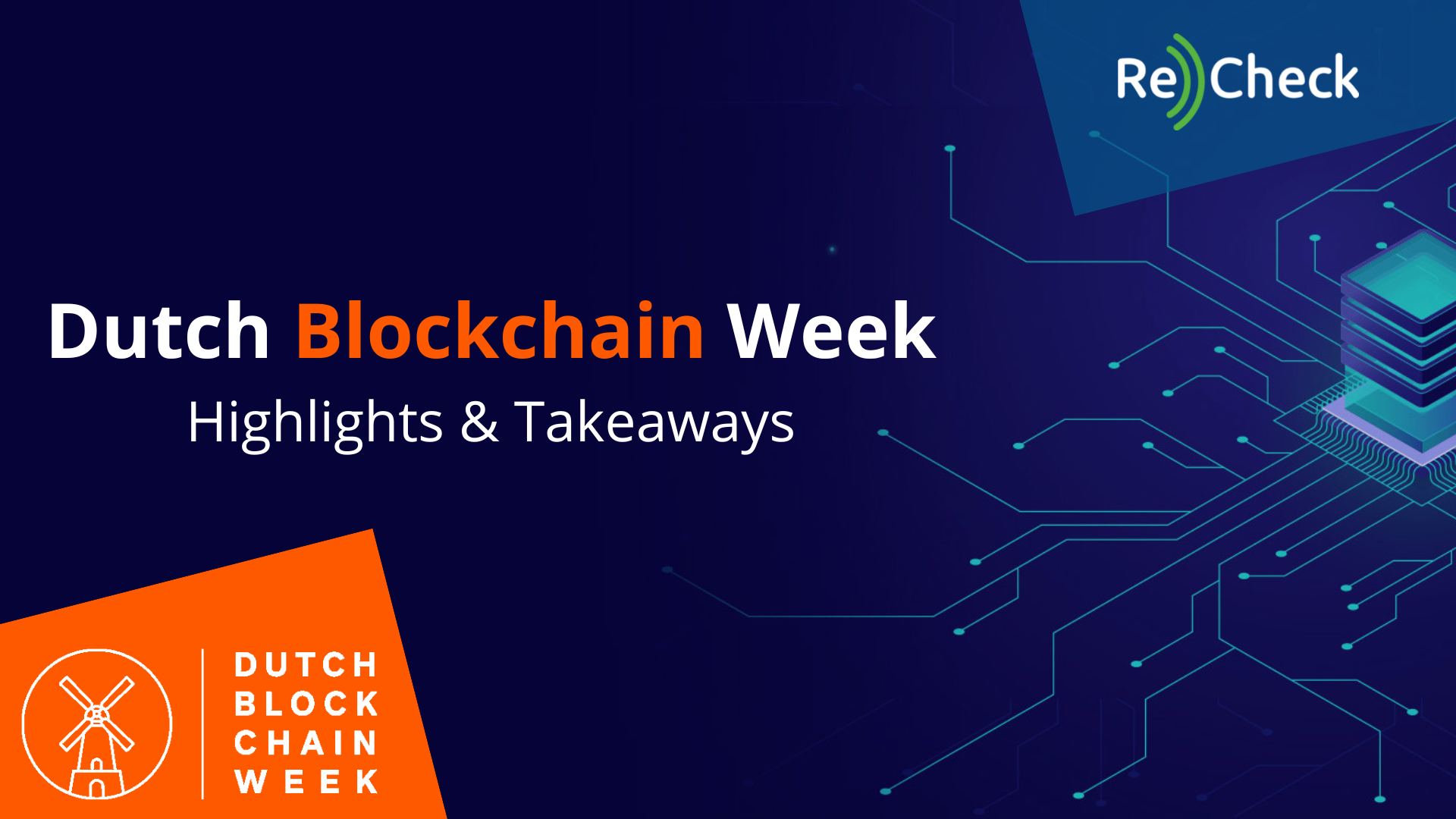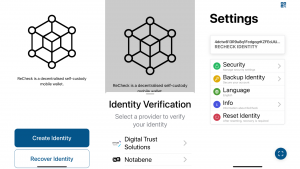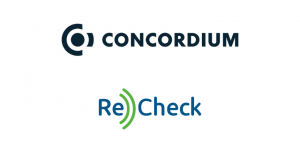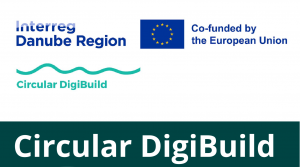The Dutch Blockchain Week (DBW) showcased the vibrant communities and projects powered by decentralised technologies in the Netherlands. The 4th edition of Dutch Blockchain Week in 2022 took place between the 21st and 27th of November and hosted a blend of physical, virtual and hybrid events. As an early member and contributor to Blockchain Netherlands Foundation (the main organiser of DBW), ReCheck took an active role in the initiative and hosted a virtual event. The webinar showcased our product for secure and private exchange of sensitive data leveraging blockchain as a digital notary.
What are the highlights from Dutch Blockchain Week?
There is a consensus that an essential aspect of positioning web3 products on the market is finding a path of least resistance and ensuring a streamlined experience. The participants in Dutch Blockchain Week agree that it is a good idea to let blockchain work silently as a pluggable component and avoid friction. One of the examples in this respect is enabling users to pay with fiat money and convert it to tokens in the background. Another emerging good practice is to bridge an existing user base in centralised platforms with wallet addresses, thus allowing authentication with decentralised wallets.
The idea of web3 is related to the semantic web – understanding the context and meaning of data. The growth of artificial intelligence and no-code platforms is a prerequisite for the so-called “synthetic data” – artificially generated information. The recent growth of deepfakes (combined with hybrid attacks and fake news) demonstrated the threats of disinformation and manipulation at a global scale. How can we use blockchain to mitigate these dangers? Crypto professionals advocate for harnessing decentralised technologies to add a layer of integrity and transparency on top of existing platforms. Many argue that blockchain will unlock the new jobs of the future – for example, people will give input to AI. This humanization will guarantee that the algorithms process data from real-world events and will boost the relevance and fairness of the web3-powered platforms of the future.
At our workshop, part of the Ecosystem events at the Dutch Blockchain Week, we presented and demonstrated ReCheck`s solution for securing and private exchange of sensitive data. The service can be integrated as a layer on top of existing platforms, making them user-centric. The demo presents functionalities such as authentication with wallets, registering and verifying data on the blockchain, end-to-end encrypted sharing, and tracing all interactions with the files. We strongly believe that the transparency of the blockchain should not necessarily conflict with privacy.
Are you interested to see how easy it is to register and verify the authenticity of data on the blockchain? Check out ReCheck service here.
The participants in the Dutch Blockchain Week share the vision that going digital is the only way to save the world. An interesting example is that 50% of the purchased clothing is returned because the selected clothes do not fit. This creates lots of waste, pollution and inefficiencies. If buyers see how they look in the sweater they consider in the online stores, they can choose the suitable garments. The same principle applies to various real-world items – dealing with physical objects requires friction, costs and effort. The phygital movement accelerates the creation of digital representations of products and buildings. Blockchain creates an environment for generating digital twins, accessing data about them, and protecting and managing ownership. Instead of moving and dealing with physical objects (or paper), businesses and consumers can interact seamlessly with tokens and digital representations. Likewise, it will be much easier for designers to create their own brands in the digital world.
“We only want innovation after we have experienced it.” This is one of the mottos of the main physical event. We can only see what the future blockchain-powered products will look like after the actual adoption. And this adoption comes with the bull market. The current turbulence and pessimism in the crypto market are healthy in shifting the focus to building products with real utility. The projects emerging during these hard times will shape the future of decentralised technologies and generate growth in the sector. Moreover, the BCNL community members emphasised the importance of bear markets to eliminate scams and speculation.
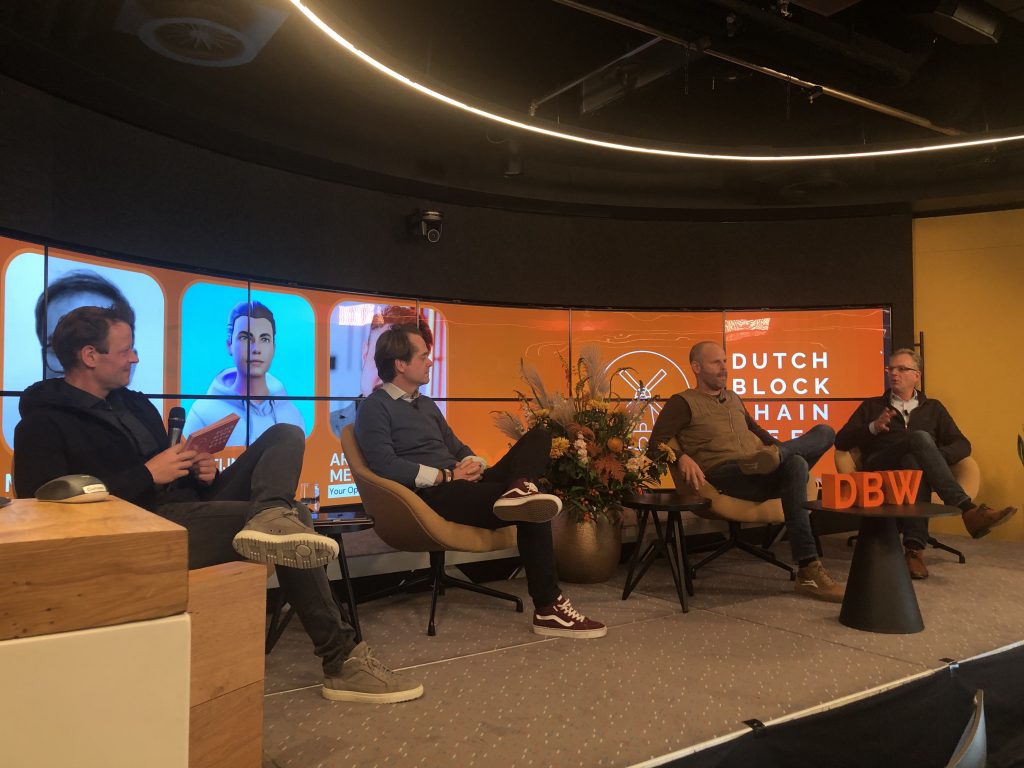
The hot topics on the blockchain horizon: DAOs and metaverse are also in circulation. According to the speakers in the panels, the DAOs fit the existing legal structures already and some DAO members choose to incorporate a separate legal entity that acts as a special purpose vehicle for signing contracts, making payments, etc. Without such a legal wrapper, there is a risk that all token holders could be liable for the decisions of the DAO. On the other hand, a significant area for improvement in most of the current DAOs is that once voting is done, the execution is not automated. Furthermore, there is a hidden dictatorship – one big token holder steering the DAO in the desired direction. And active voting is not the obvious solution because one of the biggest mistakes in the DAO realm is expecting everybody to participate in decision-making. On the other hand, the DAOs provoke philosophical questions such as: can we have accountability as a society? Do we need an individual to be accountable? Can we formulate new pseudo-legal entities that act as coherent organisms responsible for impact, decisions, and value creation?
And what about the metaverse? It is all about discovering and establishing new meaningful ways to interact with each other. Yes, the metaverse will be much more interactive and immersive than anything we have experienced so far, but this statement only scratches the surface. The real game changer is how to add meaning to our personal and business relations with more context and personalised content. We now see the metaverse as separate web pages – disconnected fractions of VR experiences and ecosystems. But one of the predictions during the event is that there will be one metaverse as an underlying protocol as there is one internet. If the future of the blockchain is multichain (different networks connected with bridges and interconnections), the future of the metaverse is enabling users to jump from one VR environment to another. This interoperability requires a lot of investments, and we have not built the tools and infrastructure components for creating an open, inclusive and meaningful metaverses.


